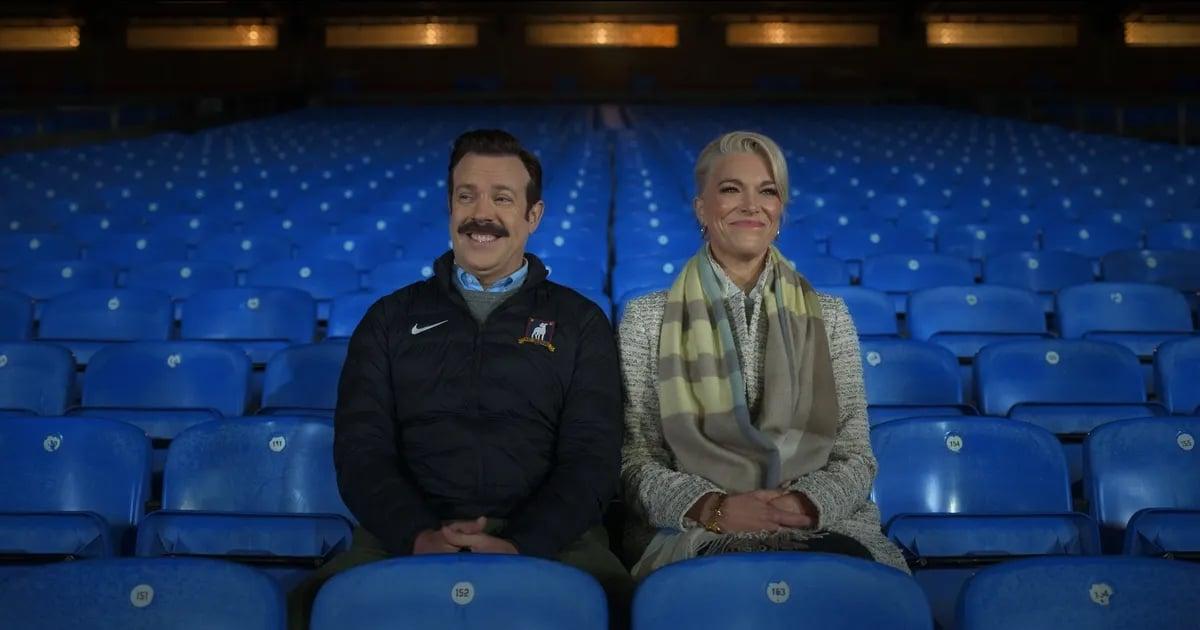If you click on a link and make a purchase we may receive a small commission. Read our editorial policy.
The Ted Lasso Effect: What Netflix, Disney, and Hollywood don’t get about Feel-Good TV
Everyone wants another Ted Lasso — but you can’t fake the heart.

Popverse's top stories
- "And my axe!" Lord of the Rings star John Rhys Davies says there's one world leader who deserves Gimli's iconic weapon
- Wonder Man is the Andor of Marvel Studios’ modern TV series on Disney+
- Absolute Batman happened because DC Comics writer Scott Snyder got bored reading about ‘superhero fatigue’
Back when Apple TV+ launched Ted Lasso in 2020, it’s likely the streamer had no idea what a sensation the show would become, particularly as even modest hits for Apple were few and far between at that point. But the Jason Sudeikis sports comedy did, indeed, become a sensation – critically acclaimed, widely viewed, and an awards season juggernaut. So naturally, networks – including Apple TV+ – have tried to “believe” they can replicate Ted Lasso, while showing once again that you can’t copy the skeleton of something without the heart.
The reason this is top of mind, other than the currently-in-production Ted Lasso season 4? The debut of Chad Powers on Hulu. Similar to Ted Lasso, which was based on a series of NBC Sports commercials for the Premier League, Chad Powers is based on a segment from ESPN’s Eli’s Place, where Eli Manning dressed up as a prospective college football quarterback to find out how try-outs work. In the six-episode series, Glen Powell fills in the latex flesh of the title character, adding a goofy voice and other weird quirks like playing football for wolves and having a pee hole so large he’ll die if water gets in it.
Created by Powell and Loki’s Michael Waldron (or, more to the sports genre point, the excellent Starz wrestling drama Heels), the six-minute segment gets fleshed out into six half-hourish episodes that are more in the mold of raunchy Farrelly Brothers comedies than the sweet, earnest comedy of Ted Lasso. The r-word is used liberally throughout. There are a lot of jokes about COVID conspiracy theories and George Soros. And there’s Chad himself, who takes inspiration from a Mrs. Doubtfire billboard and runs with it.
Ted Lasso isn't a formula that can be replicated with shows like Chad Powers

Therein lies the essential problem with launching a sports comedy that was likely at least in part pitched as “Ted Lasso but with college football.” There are moments in the Hulu episodes that are earnest, like any sports comedy. But the thrust of the humor is inherently different, and the final episodes land in a very different place than Lasso, which puts kindness and biscuits with the boss first. That definitely comes down to the central characters: Ted Lasso (Sudeikis) is a relentlessly positive force for good, taking an underdog team and trying to reinfuse the love of the game in them. Chad Powers is actually a disaster area burnout named Russ Holliday, who drives a cybertruck, dreams of playing for the XFL (for free), and, per the concept of the show, flagrantly lies his way onto a college football team using janky prosthetics in a misguided plan to restart his career.
Ted Lasso is a good guy at his core; Chad Powers is not. A.F.C Richmond, the team at the center of Ted Lasso, is the most under of underdogs. The – sigh – South Georgia Catfish (you get it), which Chad Powers joins, are not doing great, but they’re generally pretty good, and once Chad joins the team, their sports-based problems mostly disappear. They may not be champions, but they’re certainly not underdogs; they’re just dogs. Whatever the actual pitch for the show was, and whatever the surface glean and marketing implies, Ted Lasso and Chad Powers are only the same in that they have a vaguely similar real-world origin story, are about sports, and have titles named after the main characters with the same number of syllables in their names.
Netflix's Running Point is "what if Ted Lasso's Rebecca took over a basketball team?"

Netflix’s recent Kate Hudson-starring Running Point got a little closer to being a Ted Lasso clone merely by using more of that skeleton. Hudson stars as Isla Gordon, who becomes the head of the Los Angeles Waves basketball team once her brother is sent to rehab. Like Lasso, Running Point focuses on an underdog team, and the ultimate message of the series is that family is key; whether it’s your literal family, like her brothers who also run the team, or her found family like the team itself. The Netflix series doesn’t explicitly try to ape Ted Lasso’s formula, mainly because it’s co-created by Mindy Kaling, who already has a strong authorial voice of her own, and the series focuses more on misogyny in the workplace (“what if Ted Lasso’s Rebecca took over a basketball team?” you can almost hear them pitch). But over the course of the first season, that focus shifts to team dynamics and kindness in a clear nod to Ted Lasso – and becomes a smoother comedy because of it. It’s been picked up for a second season, and it’s hard to imagine it won’t continue to lean in that direction as it goes.
While Chad Powers might be a fumble when it comes to replicating Ted Lasso, Apple TV+ has been a little more successful at pushing the ethos over the goal line. The recent Owen Wilson-starrer Stick was the most flagrant attempt to create another Ted Lasso, while we waited for news of the Season 4 pickup. Focusing on golf instead of football, Wilson’s washed-up pro-golfer finds a young prodigy and decides to train him to be a champion. Where Stick gets closer is in making the title character a relentless optimist, who, like Ted Lasso, is hiding some deep-seated trauma in his backstory. The issue with Stick is that it leans too far in either direction, with the rest of the characters mostly not on board with Stick’s shenanigans (other than the stand-out eighth episode, where they all team up to pull a con on Timothy Olyphant’s character), and extending Ted Lasso’s over-arching panic attacks storyline to nearly every character on the show giving them all a different traumatic backstory. Stick gets close to what makes Ted Lasso special, but it’s not a hole-in-one by any stretch of the imagination (though it has also been renewed for a second season).
Ted Lasso was a hit, so of course, streamers think they can reproduce the magic. But from Chad Powers to Running Point, they’re finding it's not so easy.

It’s a problem that has plagued TV for time immemorial, and Hollywood at large, always seeing a breakout success and trying to recreate it beat for beat, when there’s often something ephemeral about why that particular thing worked… And often the main reason is that it feels fresh and new, which is not a feeling you can create twice (see Hollywood’s current arms race to build a new KPop Demon Hunters for more on this). This has happened hundreds of times, but for one example: TV’s slurried slop of LOST clones that came out once the series hit big. Every network churned out mystery box series with large ensemble casts and one-word titles that flashed quickly on screen. But the appeal of LOST, while, yes, at least in part, was the ongoing weirdness… It was really about the characters, stupid. The reason the show was successful was not because Charlie (Dominic Monaghan) wrote “Not Penny’s Boat” on his hand or Locke (Terry O’Quinn) discovered a hatch in the ground… It was that we cared about Charlie and Locke (and all the rest) and desperately needed to know what would happen to them next.
The only series that does actually avoid that Lost-clone problem and replicates the feel of Ted Lasso? Apple TV+’s Shrinking, which has nothing to do with sports. And that’s actually the key to the whole thing, here: to not try to take what works and do it again, but figure out why people are responding and come up with your own take on it. It certainly helps that Shrinking, a show about Jason Segel’s depressed therapist getting too involved in his patients’ lives (ostensibly the concept of the show, though it veers almost immediately from there to become an ensemble comedy), comes from Ted Lasso co-creator and TV veteran Bill Lawrence, alongside Segel and Ted Lasso star and writer Brett Goldstein. But it feels like a companion piece to Ted Lasso, not just because of the behind-the-scenes staff, but because it captures the same sense of uplifting heart and humor that existed in the earlier series.
There are more surface trappings, to be sure, from the musically adjacent theme song to a brisk and breezy pace. But these are characters you care about, and like the best comedies, the concept is second to the people involved. Ted Lasso has an ongoing plot about A.F.C. Richmond trying to win even one game, but the reason you want them to win is because you care about the characters first. And while human psychology is not a game, similarly, in Shrinking, you want these characters to heal and grow because they are intrinsically good people, and you need their lives to be better.
That’s the key… Not to pitch “it’s Ted Lasso but with [insert different sport here].” But to develop characters worth spending time with in your living room, or wherever you watch TV. The sports can be the plot, as it is in Chad Powers, Stick, and Running Point. But that’s just the outer trappings. If you really want the next Ted Lasso, the trick to it is to develop characters worth watching, with earnest hearts worth rooting for, who believe in each other and their ability to succeed. Or, perhaps take the harder route and make something entirely new. As Danny Rojas (Cristo Fernández) says on Ted Lasso, “Football is life.” But you need new, fresh-feeling lives – not just football – to make a great TV show.
Want to know what's coming up next in pop culture? Check out Popverse's guides to:
Follow Popverse for upcoming event coverage and news
Find out how we conduct our review by reading our review policy
Let Popverse be your tour guide through the wilderness of pop culture
Sign in and let us help you find your new favorite thing.
















Comments
Want to join the discussion? Please activate your account first.
Visit Reedpop ID if you need to resend the confirmation email.